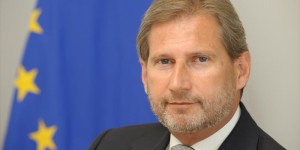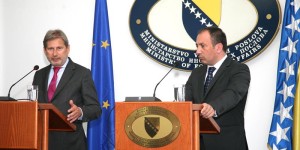This interview was originally published in the daily Vecernji List on 23 February 2015
What should be priorities of new authorities in Bosnia and Herzegovina and will the EU come up with new conditions?
As stated in the Council Conclusions of December 2014 and reflected in the written commitment, Bosnia and Herzegovina will work out – with the assistance of the EU – an initial agenda for reform, in line with the EU acquis. Civil society will be closely involved in the development of the reform agenda. It will include reforms under the Copenhagen criteria – socio-economic reforms, rule of law, good governance – and also agreed functionality issues including the EU coordination mechanism. The framework for the socio-economic reforms is provided by the Compact for Growth and Jobs, particularly its 6 key recommendations that we believe could begin to revitalise the economy and to spur investment and jobs.
For the renewed approach and reform agenda to succeed, the entire institutional and political leadership of BiH at all levels will need to jointly work on the European future of this country for the benefit of all. The EU agenda – that is, the need for reforms that will enable BiH to interact fully with the EU – will not change. What needs to change is output by BiH leaders and institutions. They need to carry out the necessary reforms.
The time is now. The citizens and the leaders must seize their EU future – and fast.
You are aware of the situation in Bosnia and Herzegovina and the position of Croats as the smallest in population among constituent peoples. Do you think that progress on the EU path will bring changes when it comes to the rights of constituent peoples and citizens in BiH?
Bosnia and Herzegovina will succeed with the full political participation of all its peoples and citizens – Croats, Serbs, Bosniaks and Others. That is the only way it can prosper, the only way it can join the European Union.
Provided there is the political will on the side of the relevant authorities, the constitutional set up of Bosnia and Herzegovina does not prevent them from working together on reforms that are beneficial for all citizens. These reforms are what EU integration is all about – reforms that improve the economy, the education system, and the environment, and stamp out corruption and make government more efficient and responsive to citizens.
The EU respects the rights of all peoples and citizens and is committed to promoting equal rights. Most people and citizens in BiH share the vision for this country to join the European Union. The political leadership of BiH should rally around this vision and generate the will to meet requirements of European integration. The European framework offers many solutions for BiH yet political attention is, wrongly in my view, often focused elsewhere.
Let me repeat once again that people in all parts of Bosnia and Herzegovina expect better lives and future perspectives for themselves and their children in the first place. It is therefore concrete policies for achieving these goals which should be in the focus of Bosnia and Herzegovina’s politicians.
20 years of the Dayton Peace Accord will be marked this year. Is it realistic to expect its change or a constitutional reform at least?
Bosnia and Herzegovina needs constructive solutions not new divisions.
We need to have administrations that function effectively and serve citizens well. Where there is needless complexity and inefficiency we need to see ideas to improve; the EU is ready to support and reform in this spirit is very much part of the EU integration process. A debate should be engaged.
It’s down to all the institutions to prove their worth to the citizens. Citizens can then take a view on whether they are satisfied.




